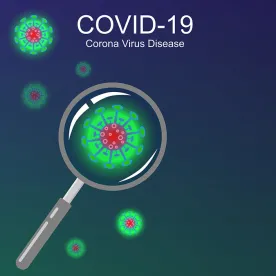The Departments of Labor, Treasury and Health and Human Services (collectively, the Departments) recently issued new guidance in the form of FAQs to plan sponsors and administrators of group health plans to assist with them with preparations for the end of the COVID-19 National Emergency and the Public Health Emergency.[1]
On March 29, 2023, the U.S. Senate passed H.J. Res. 7, which terminates the “National Emergencies Act” declaration concerning COVID-19 that President Trump enacted on March 13, 2020. President Biden signed this into law on April 10, 2023, thereby establishing that the official end to the National Emergency is effective April 10, 2023 and that the Public Health Emergency will end on May 11, 2023. As previewed in an earlier Client Alert, Biden had initially signaled in a January 30, 2023 announcement that the National Emergency and Public Health Emergency would both end on May 11, 2023. However, the signing of H.J Res. 7 accelerates the end of the National Emergency to April 10, 2023 while keeping the end of the Public Health Emergency on May 11, 2023.
With these official end dates in place, employers that sponsor group health plans should begin preparing for changes that will impact everything from coverage for COVID-19 testing and vaccines to deadlines for COBRA, HIPAA special enrollment, claims, appeals and external review requests.
COVID-19 Testing
The FAQs confirm that plans will no longer be required to provide free COVID-19 diagnostic testing, including over-the-counter tests, after the end of the Public Health Emergency on May 11, 2023. The Departments encourage plans to continue covering these tests, however. Plans that opt to eliminate COVID-19 testing coverage after May 11, 2023 should communicate those changes to employees beforehand, including an explanation of any cost-sharing, prior authorization or other requirements.
COVID-19 Vaccines
The FAQs also state that non-grandfathered health plans must continue to provide employees with COVID-19 vaccines, boosters and other preventative services from in-network providers without cost sharing as part of the Affordable Care Act preventive services mandate. The FAQs further clarify that if a health plan does not have an in-network provider for immunizations, the plan must cover the item or service when furnished by an out-of-network provider and may not impose cost sharing.
COVID-19 Deadline Extensions
As noted in our earlier Client Alert, following the end of the “Outbreak Period” certain extended deadlines for requesting HIPAA special enrollment, electing COBRA continuation coverage, paying COBRA premiums, filing claims and appeals, and requesting an external review will end. The “Outbreak Period” is a defined period that began on March 1, 2020 (the start of the COVID-19 National Emergency) and ends 60 days after the end of the National Emergency. Because the official end date to the National Emergency is now set as April 10, 2023, this means the Outbreak Period will end on June 9, 2023. Deadlines that were tolled during the pandemic must now end on the earlier of (1) one year from the date the individual first experienced an event that makes him or her eligible for relief, or (2) 60 calendar days after the announced end of the National Emergency (i.e., June 9, 2023). The FAQs provide several useful examples of how to calculate these new deadlines. However, because the FAQs were released before the official end to the National Emergency was established, the examples in the FAQs and in our earlier Client Alert assume an Outbreak Period end date of July 10, 2023 not June 9, 2023 and should be adjusted accordingly. You can also refer to our Client Alert for additional details on steps plan sponsors and administrators should take to communicate these new deadlines to participants and beneficiaries. In its FAQs, the Departments also encourage plans to notify impacted employees before the deadline and to consider making reasonable accommodations to employees.
Special Enrollment Period for Loss of Medicaid or CHIP Coverage
The FAQs also address the many employees and dependents enrolled in Medicaid or CHIP who may soon lose eligibility under those programs. Some states have already started to unwind “continuous enrollment,” pursuant to which Medicaid agencies stopped terminating enrollment in March 2020. Many of those agencies will now resume eligibility determinations for Medicaid and CHIP coverage. The DOL is encouraging plan sponsors to make sure that impacted employees know that they have HIPAA special enrollment rights to enroll in the employer’s group health plan. Employees and their dependents are eligible for special enrollment in a group health plan if:
-
they are otherwise eligible to enroll in the plan;
-
the employee or dependent was enrolled in Medicaid or CHIP coverage; and
-
the Medicaid or CHIP coverage was terminated as a result of loss of eligibility.
The FAQs also remind plan sponsors that a group health plan is allowed to be more generous and offer an election window that is longer than the statutorily required minimum of 60 days. Plan sponsors wanting to allow for additional time, may need to amend their plans to provide for an extending special enrollment period.
The DOL has provided a flyer that employers may use when communicating to their employees about their health care options upon losing Medicaid or CHIP coverage.[2]
COVID-19 Treatment and Testing Under a High Deductible Health Plan
Finally, the FAQs confirm that individuals covered by a high deductible health plan (HDHP) will remain Health Savings Account (HSA)-eligible even if the HDHP in which they are enrolled provides COVID-19-related medical care services, testing and treatment prior to the satisfaction of the HDHP’s applicable minimum deductible following the end of the Public Health Emergency (until further guidance is issued). The IRS previously announced that HDHPs could provide COVID-19 testing and treatment for an HDHP participant who had not met their deductible without impacting the individual’s HSA eligibility. However, prior to the issuance of these FAQs, it was unclear whether this HDHP relief would continue past the end of the Public Health Emergency. The full set of the Departments’ FAQs is available on the DOL website. Please refer to our Client Alert for additional information. In addition, we invite readers to join Hunton’s Employee Benefits Academy webinar scheduled for May 25, 2023, which will address steps to take with regard to the end of the National Emergency and Public Health Emergency. Plan sponsors and administrators should continue to monitor developments in this area and begin preparing now for these changes.
FOOTNOTES
[1] The FAQs are titled “Frequently Asked Questions about Families First Coronavirus Response Act, Coronavirus Aid, Relief, and Economic Security Act, and Health Insurance Portability and Accountability Act Implementation Part 58.”
[2] This flyer is found at: https://www.dol.gov/sites/dolgov/files/ebsa/about-ebsa/our-activities/ resource-center/publications/losing-medicaid-or-chipflyer.pdf






 />i
/>i

